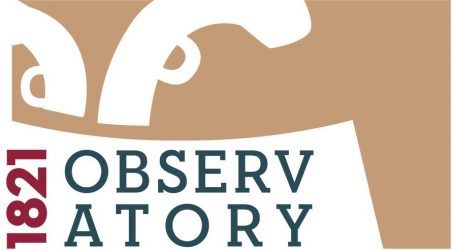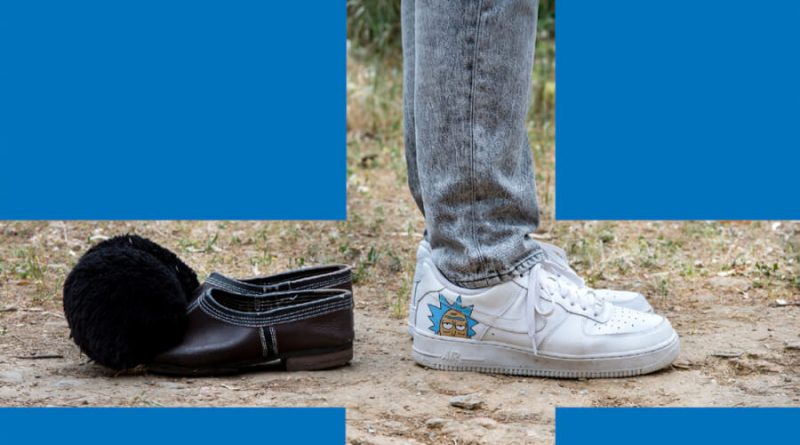School celebration, theatrical performance or a proposal to teach history
Teen Look, the student theatrical education programme of the Michael Cacoyannis Foundation, brought together ten students into the same stage – school class and asked them to organise a school-type celebration of the 25th March national day that was cancelled and rescheduled. During an overnight at school, the ten teenagers explored the main phases of the revolution and sought on stage to distinguish what they should include in or exclude from their narrative, whether they would ignore those dark aspects of history that are normally omitted from textbooks or would highlight the invisible sides of the past. They contemplated which voices should be heard and which personalities should remain heroised. In this endeavour they pondered, collaborated but also disagreed, observed, studied, discovered, became more aware and judged.
The teenagers delved into the events and conditions of the past, went beyond what is taught in the classroom and traced historical silences: the armatoles’ secret deals with the Turks, the heroes and antiheroes of the revolutionary project, the role of philhellenes as well as of Evanthia Kairi and Nikiratos, the defeat in the Battle of Peta, the liberal constitutions, especially the Constitution of Epidaurus, the financing of the struggle, the loans and the bonds, the consequences of the civil wars, the Ottoman narratives, the 1821 Revolution in film.
With the help and guidance of philologist Natasha Merkouri, students from nine different schools discussed the artistic and academic issues with specialised professionals, in order to form a more comprehensive perspective on the question of the Greek revolution. The programme enjoyed the support of the Ionian University’s postgraduate programme in Historical Research, Teaching and New Technologies, the National History Museum and Metaichmio publishers. It formed part of the postgraduate programme activities to mark the bicentenary of the Greek Revolution in collaboration with the Nea Paideia academic association. The project “We are born as history: Teenagers face the revolution” is part of a series of theatre-documentary performances that directs teenagers towards history with the aim, not merely of providing information, helping form opinions or answers but mainly of asking questions and to highlight contradictions.
The students began to unravel the dramatic skein by asking the question “what do we not know about the revolution?”. With this question they proceeded, through experiential techniques such as dramatisation, to key points of the struggle. During their presentation, the question arose as to how history changes historical subjects, without detracting from the impact of the facts or the heroism of individuals.
The section of the performance that stood out was that of the narratives of the “non-visibles”. The testimonies of Muslim residents of Tripoli were delivered subversively descring the violence used by the Greek fighters against their opponents during the conquest of the city, cruelty that even shook the European wave of philhellenism. An interesting scene, regarding the content and the way of presentation, was the transformation of Karaiskakis’ attitude through the path of consciousness and the question “How does one want to be remembered?”. An armatole, he joined the revolution, to which he devoted himself.
The research for the artistic aspect was spread over the school year with history and drama workshops. Depending on the topic, the team members worked on selected texts and audiovisual material. In addition, they invited external collaborators to give presentations on those aspects of the topic that they could not cover themselves in their own study. Through discussions and informed judgments that were ingeniously incorporated into the play, the teenagers created their own scripted narrative of the revolution. Among the difficulties they faced was that of long-distance cooperation, as their work, apart from two in-person meetings, was conducted online.
The speakers who talked to the teenagers, each from their own perspective and area of expertise, about those aspects that – as they pointed out – are not discussed in the classrooms were: Angeliki Darlasi (author and of creative writing teacher), Kostas Therianos (Coordinator for Social Science Educational Project at the 4th Regional Centre for Educational Planning of Attica), Stefanos Kavallierakis (Director of the Athens City Museum – Vouros Eutaxias Foundation), Natasa Kastriti (Curator of Collections of the National and Historical Museum), Anastasia Koumidou (Director), Simos Bozikis and Elias Stouraitis (who hold PhDs in History who hold PhDs in the Ionian University), Kiki Sakka (PhD in History and president of the Association for History Education in Greece).
The presentation of the videotaped performance was followed by a discussion on issues related to the approach and teaching of the Greek revolution and whether the theatre has a role in the means to approach the past. The teenagers had the opportunity to ask their interlocutors about issues related to the understanding of this difficult and wide-ranging project whose central question goes beyond the Greek case. The discussion was attended by Professor Kostas Angelakos of the Ionian University, Vicky Gerontopoulou, coordinator of the Onassis Library, ERT journalist Marilena Katsimi, actor Spyros Stamoulis and speakers from the research institutions mentioned above.
Katerina-Sofia Katsikopoulou, Archaeologist - Anthropologist

